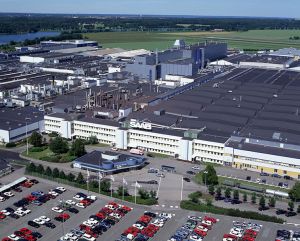7 December
2011
Trade Unions and Business Corporations: Reaching for the Common Good
Posted in Ethics in Business, Human Rights, Social Commentary, World Affairs
Both the newspapers and the televised media constantly remind us of our current economic difficulties. The revenues and profit-margins of firms large and small are shrinking. Many shops and factories are reducing workforces, and some are closing-down altogether with larger-scale job losses. It is therefore refreshing to read that workers at the Caparo Merchant Bar steel mill in Scunthorpe have agreed to a fifty percent cut in their pay, and have also agreed to take a prolonged holiday over the Christmas period. This agreement has been reached through the trade union to which most employees at Caparo Merchant Bar belong, the Community Trade Union.
Unfortunately it is often the case that when a company has suffered financially the default reaction of the trades unions involved is not to come up with a positive response. Costs do have to be reduced, at least in the short-term, and one of the highest costs for any company is its staffing. It is even more unfortunate that trades unions do not seem even to be merely on the defensive; rather their tendency is towards reactionary positions. Any reduction in the numbers employed, or in wages, whatever the pressing circumstances, tends to be rejected in a knee-jerk manner. The public sector strikes of last week symbolise this: a proposed reduction in employer contributions to individual pensions, due to the unaffordable burden of the present system, is resisted not partially and rationally but wholly and irrationally.
The situation at Caparo can be interestingly compared with that of the Saab Automobile company. A sale of the firm to a Chinese conglomerate is currently in process. The past year has seen a far from amicable relationship between trades unions to which the workforce belongs and the company, resulting in the former attempting to have the latter declared bankrupt. The attitudes of both employers and unions have crucial impacts upon outcomes for one and all.
Saab Automobile was part of the larger Saab-Scania conglomerate until 1989 when General Motors purchased enough of the company to take a controlling stake. In 2000 General Motors purchased the remaining shares. Since being founded as a motor manufacturer in 1944 profit had not been achieved until General Motors took over ownership. However, following the global downturn of 2008 General Motors began to divest itself of a number of companies, and Saab was one of these. At the beginning of 2010 the Dutch specialist car manufacturer Spyker took on ownership of Saab. Problems arose in the April of this year when production stopped due to a dispute between the company and unpaid suppliers. In June the company announced that the wages of employees could not be paid. Following a union-led threat of liquidation funding was found to pay wages. Matters had not improved in July, when white-collar staff did not receive remuneration.
By August debts caused the Swedish Enforcement Administration to begin proceedings against the company. Wages and salaries for the entire workforce were again not paid for that month. Production stopped in September and the company applied for bankruptcy protection, allowing it to remain a legal entity whilst seeking a new owner. The two trades unions representing employees simultaneously requested that the company be declared bankrupt. Saab was granted bankruptcy protection and has since then been in talks with various Chinese industrial and banking corporations.
The interesting point when comparing the cases of Saab and Caparo Merchant Bar is that of relationships between the relevant trades unions and managements. In the case of Caparo both have clearly sought dialogue, with long-term survival of the company and the employment of the union members of primary concern. In the case of Saab this has been lacking. The trades unions there have sought to protect only the immediate concerns of Saab staff. On the other side, it would seem that management have not sought to keep legitimate workforce representatives abreast of the financial position of the company, and have failed to seek an agreement which might increased likelihood of long-term survival.
Trades unions have arguably a chequered past, some of them having associated with Communist regimes and movements. At times they have pursued ideological aims against the real interests of the workforces they have formally represented. This history does not vitiate the potential good trades unions can bring to society. Workers, particularly in large companies or organisations, should be treated respectfully by those who employ them. Unions can provide the organised response by which workforces may be effectively represented. Simultaneously managements can, through them, communicate effectively with their workforces about a common interest in current terms of trading and difficulties. Such a dialogue works ideally for the Common Good whereby society as a whole benefits.
The deal between the Caparo Merchant Bar steel company and the Community trade union is prima facie an impressive example of this at what all recognise to be a difficult time. Sadly, in the case of Saab, and perhaps also in that of the UK Civil Service, it would appear that no such reaching out for the Common Good is anticipated.

Leave a Reply